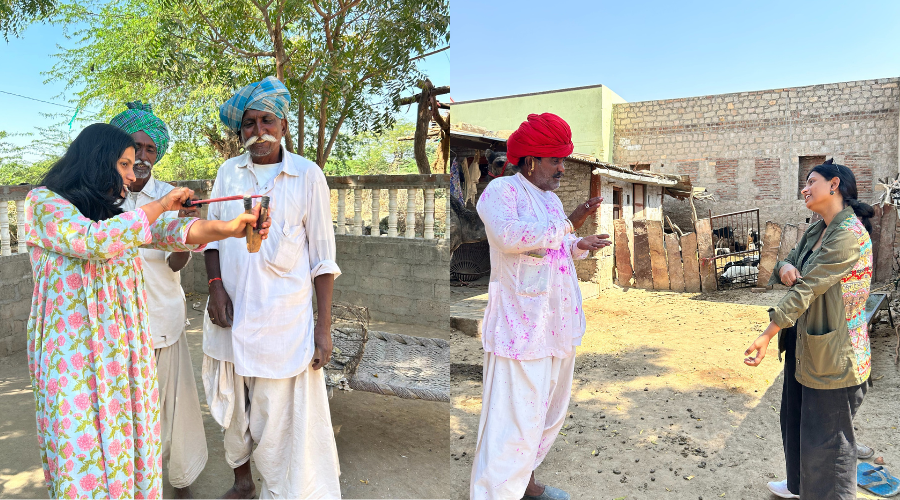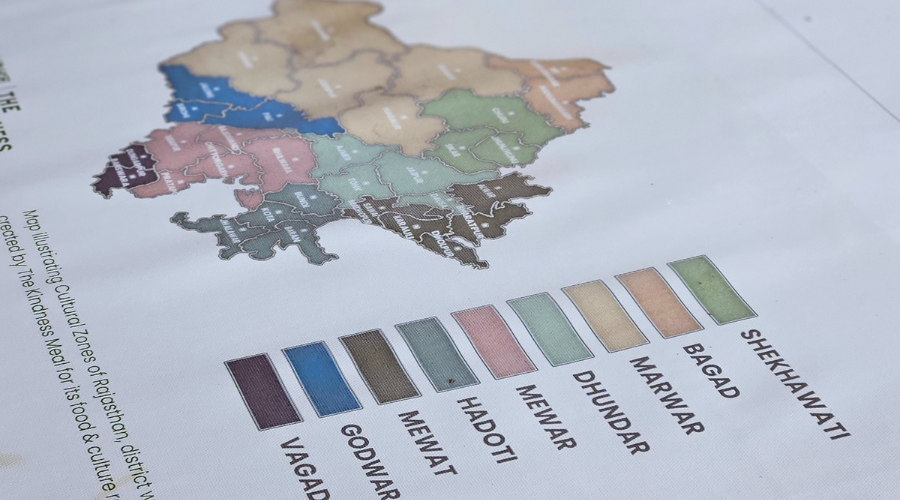How Dipali Khandelwal Is Preserving Rajasthan’s Culinary Traditions With ‘The Kindness Meal’
Dipali Khandelwal, founder of The Kindness Meal has been working with communities across Rajasthan to preserve the state's lost ingredients and culinary traditions.
“On a hot June afternoon, I was out for a field visit in a village an hour away from Jaipur. Sick and tired of being fed the ‘civilised’ aloo chhole every day, I requested one of the ladies to serve me chach roti (chapati soaked in buttermilk)—something she was feeding her son after he returned from school. When my request was met with ignorance, I decided to try again.
Upon my insistence, she sat me down and said, ‘Yeh dehatiyon ka khaana hai, aapko acha nahi lagega (this food belongs to the illiterate, you won’t like it).’ I looked at her son, whose spoonful of chaach hung midway. His stare oscillated between me and his mother. ‘Is this food stale? Is it something I can eat, but she can’t?’ were the questions his eyes wanted to ask.
That look has stuck with me ever since,” said Dipali Khandelwal, an “accidental” (so she says) food researcher and founder of The Kindness Meal, a project aimed at preserving Rajasthan’s rich culinary heritage and traditions by documenting its lost ingredients and recipes.
About Dipali
Born and raised in a large Marwadi joint family in Jaipur, food brought Khandelwal’s family together and was essential to all their conversations. “In a large family, you have people from different parts of the state— like my mother was from a different part of Rajasthan, and so was my aunt. This exposed me to different flavours from the very beginning,” said Khandelwal.
Her family, particularly her grandfather, was almost obsessed with sourcing quality ingredients and produce. “He had specific vendors for masalas, fruits and vegetables, and every other ingredient,” added Khandelwal. Thus, she received her love for food and curiosity towards understanding ingredients from her family.
As someone who always dreamt of moving out of her city for college, Khandelwal ended up at Delhi University but found herself lost there. “Life suddenly became fast-paced—everything changed, from what I ate to what I was applying on my face. I found myself drifting away from a dream I had dreamt ever since I was a teenager,” said Khandelwal.

She dropped out of college, and after a few quiet months of understanding herself and her dreams, she started working with Awaaz Studio (an art promotion house where artists from all around the globe come together to perform, share and celebrate the gift of art) and interacting with local artisans and communities from villages across Rajasthan. “The distance I felt from who I was in college was no longer there. I felt most like myself with these local artisans and their families,” recounted Khandelwal.
She spent the next seven years in the arts and culture space, curating music festivals and working with local communities. This led her to understand her land’s culture, cuisine, and geography better.
“When I interacted with these local communities, I felt like one of them. But that was my reality, not theirs,” she added.
About Kindness Meal
While Khandelwal felt like one of them, she was always met with special treatment. “Whenever I would go, they would serve me a meal that they would consider civilised and urban—there would always be a vegetable paired with rice or daal baati churma,” said Khandelwal. This left her wondering if these people actually ate what they were serving her because, as a Rajasthani, even I can attest that rice is a rarity in our meals.
As her curiosity and interaction with people increased, they started bringing in dishes, took her to jungles to forage herbs and greens, and also shared ingredients that were not very well known to others. “I remember I was introduced to ajwain (carom seeds) laddus that are prepared during winters, and those who introduced it to me started laughing when they shared that it was also a great aphrodisiac,” said Khandelwal.
However, when she observed things back home, she found bell peppers, baby corn, olives, and jalapenos in her refrigerator—things she had never grown up eating. “When I would return home from my fieldwork, I felt like I was living two parallel lives,” Khandelwal shared.
She also shared how a catch-up over coffee with three of her friends helped her understand how the commercialisation of food has changed what is served on our plates and how we see our local foods. “I sat for a coffee with three of my friends who came from different parts of the country, followed different cultures, and ate different cuisines, but a point of commonality between us was our love for quinoa,” said Khandelwal.

This led her to realise that, in becoming global citizens, we are no longer citizens of the land we come from. “And I have a problem with this,” she commented.
This prompted her to start The Kindness Meal out of curiosity and an intention to preserve something that binds us all, yet differentiates one person from another.
It started with a five-course dining experience at a café in Jaipur. Each course was meant to appeal to a sense. It was a guided experience where phones were not permitted, and diners were not allowed to chat with each other when the food was on their plate.
What started with documenting culinary traditions, recipes, and lost ingredients is now divided into three verticals— research, education, and policy advocacy.
Their work includes conducting primary research and fieldwork across the nine cultural zones they have divided Rajasthan into. “This includes everything ranging from how an ingredient arrived there, how it is grown now, recipes from these indigenous ingredients, and the stories linked to them,” explained Khandelwal.
Under the education vertical, they carry out workshops with children between 9 and 14 years of age (as that is the time when the idea of identity is planted in them). “When I asked a class full of children where Daliya comes from, 90 per cent of them told me that it comes from a packet, and that needs to change,” said Khandelwal.
Finally, policy advocacy is the third leg of their work. “A lot of things need to change at the policy level. When a school-going child is taught about a balanced diet, but what they eat is quite opposed to it, they form an idea about themselves and their status in society,” said Khandelwal.
She works with ministries and government departments to improve food security and availability among people in remote and small villages across the state.
Food And Identity
Khandelwal recounted an incident from a remote village in Bikaner with no electricity and little connectivity, and where most people depended on rainwater for their water needs. Bajra, or pearl millet, was the only plant growing in the area, and she looked forward to documenting many bajra recipes.
However, no one was willing to talk to her about the millet. “One fine day, an old lady opened up about her recipe for bajre ka malida. As we spoke, her daughter-in-law walked in and, beaming with pride, mentioned how they would themselves eat bajra but never let their children eat it,” said Khandelwal.
I discovered that for her, it was almost like she had saved her children from the poverty associated with bajra, and that made her very proud,” she added. It is this sentiment associated with our indigenous ingredients that Khandelwal has been devotedly working to redefine through The Kindness Meal’s interactive activities, storytelling, and events. “Food is an integral part of a person’s identity, yet many of us associate so much shame with our local and indigenous foods,” she said.